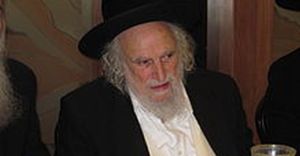“Frankly, I’m not sure what to make of this,” said Rabbi Grosser Chumra of Bnei Brak.
 Jerusalem, March 17 – A leader of a prominent faction of Ultra-Orthodox Jews in Israel mistakenly invoked his religious authority in the form of an Islamic ruling today, sowing confusion among his followers and the general public.
Jerusalem, March 17 – A leader of a prominent faction of Ultra-Orthodox Jews in Israel mistakenly invoked his religious authority in the form of an Islamic ruling today, sowing confusion among his followers and the general public.
Rabbi Shmuel Auerbach of Jerusalem issued a fatwa Tuesday morning urging his followers not to participate in the day’s parliamentary elections. His followers include tens of thousands of eligible voters, and if obeyed, the fatwa had the potential to cost the ultra-orthodox alliance of parties a full seat in the Knesset. However, an actual fatwa carries no weight in Jewish practice, and it therefore remains uncertain whether Rabbi Auerbach’s fatwa had the anticipated effect.
Normally, explains Jewish Studies Professor Albert Facepalm of Columbia University, Jewish religious rulings are issued in the form of what is called either a p’sak halacha or a t’shuva, and are considered binding on the community for whom that Rabbi is the primary religious authority. Issuing a fatwa, however, throws a conceptual and practical wrench into the works, as Jewish communities have traditionally not demonstrated adherence to rulings that are a staple of Islamic, not Jewish, jurisprudence. As such, the fatwa in question has generated conflicting responses from Rabbi Auerbach’s community. The Rabbi was unavailable for comment, and aides did little more than shrug.
Also complicating matters is a lack of clarity among the news media as to who adheres to Rabbi Auerbach’s line. While rough estimates exist regarding the number of his disciples and followers, political discipline among the ultra-orthodox has frayed over the last decade. That phenomenon means both that the political parties claiming to represent the demographic have struggled to maintain Knesset representation, and that assumed loyalty to a particular religious authority does not necessarily translate into automatic adherence – especially when that authority issues the unfamiliar fatwa and not one of the classically Jewish forms of ruling.
“Frankly, I’m not sure what to make of this,” said Rabbi Grosser Chumra of Bnei Brak, an avowed disciple of Rabbi Auerbach. “Is it someone’s idea of a late Purim joke?” Rabbi Chumra added that he had not planned on voting anyway, since doing so would compromise his eligibility for membership in the Higher Antizionist Rabbinic Executive Directorate International (HAREDI), which decries participation in Israeli democratic processes as endorsement of Satan incarnate – language and content very much in line with those of many fatwas.




